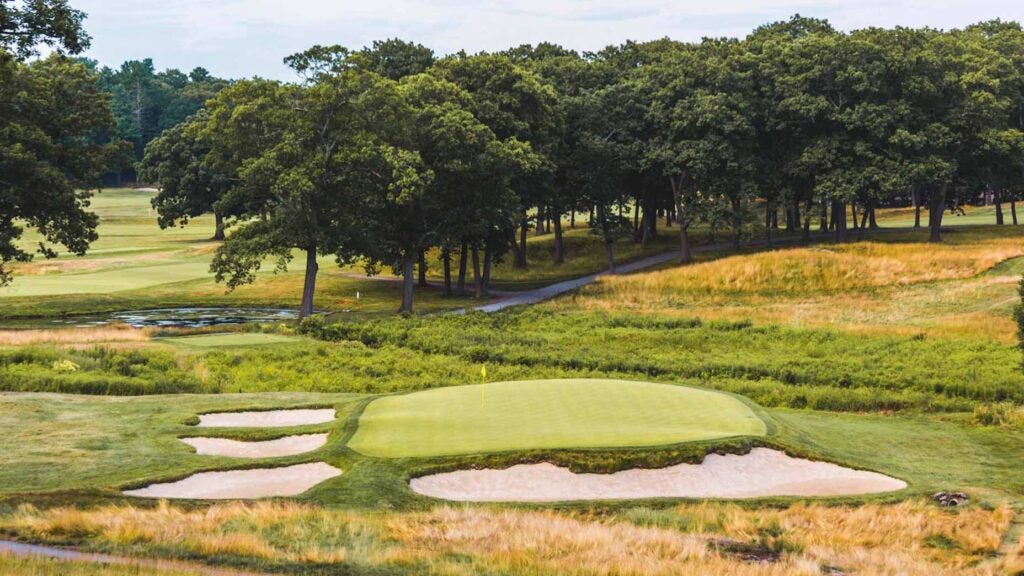The par-3 11th hole at The Country Club is called “Redan,” which is a funny name for a hole that is not, in fact, a Redan.
The 11th doesn’t possess the Redan’s quintessential towering, angled green, nor its peppering of bunkers. The putting surface is missing a gentle, front-to-back slope. And please, don’t try to convince the good people of North Berwick — owners of the game’s very first Redan — that this tee shot is “blind.”
Rather, the par-3 11th hole at TCC is a short, downhill chute, a 130-yard flipped wedge from an elevated tee box into a deceptively tight green. Its closest sibling might not be the 15th at North Berwick but rather the famed oceanside 7th at Pebble Beach.
“It’s a target that looks big but plays small,” says Gil Hanse, who led the restoration of the 11th ahead of this year’s U.S. Open. “You’ll have a short iron in your hands, but there are some hole locations you have to play away from.”
*As written in the above image*
In the heights: “The elevated nature of the tee shot—because the ball is in the air for so long and it’s got more time to curve—means that misses left or right or short or long are going to be exaggerated,” says Hanse.
Beach retreat: “What the bunkering does here is say, ‘This hole is an aerial test.’ You’ve got to fly it to the green because playing from these bunkers, across that narrow green, is not going to be an easy shot.”
Size matters: “Over time, the green had shrunk” — as noted by the dotted line — “and the primary change we made was restoring it to its original scale, which then introduced significantly different hole locations, including close to the edge on the righthand side.”
No fly zone: “Missing here [right of the green] is a no-go. It’s wet, ruffled, thick. You never know what you’re gonna get.”
The bounce house: “If you hit the edges of the elevated green, it will actually repel your ball.”
***
The last time U.S. Open competitors tussled with No. 11 was in 1913, when the national championship was won by a man with a funny name, Francis Ouimet. The hole was deemed too short for play in the ’63 and ’88 Opens, but it never lost its luster, says Hanse:
“The idea pretty much was, instead of walking past this really cool golf hole, let’s get them to play it.”
After Hanse’s overhaul of the hole — which includes a major expansion of its green — the USGA formally returned it to the championship routing in late 2021.
“It’s night and day,” Hanse says. “It had been set up where all the hole locations were in the middle of the green. Now you’ve got one in front, just over the bunker, you’ve got one falling off front right — you’ve got all these options.”
Playing anywhere from 105 to 142 yards in length, it will be the shortest hole on the course. But will it be too short? Hanse doesn’t think so.
“There’ll be enough defense to the hole,” he says. “The length may lead the pros to hit shots or take chances that they might be less willing to take on other golf holes. From a golf architecture standpoint, there’s a nice mental challenge. Here’s a tough target to hit. Let’s see how aggressive you want to be on it.”
The 11th is a peculiar hole with a peculiar name. But as Ouimet knows all too well, at The Country Club it’s not about what you’re called — just how you’re remembered.
